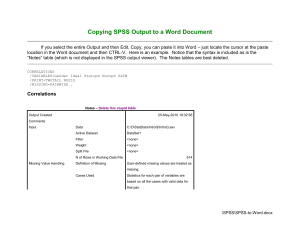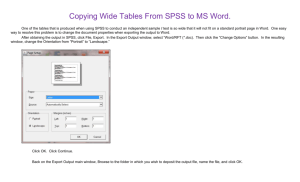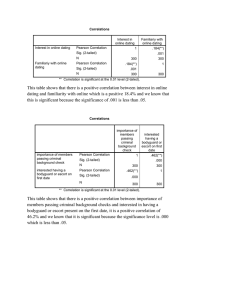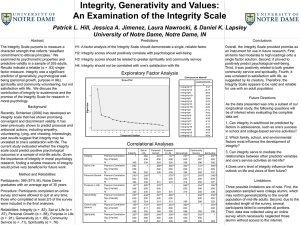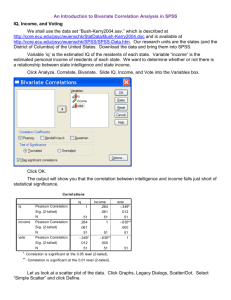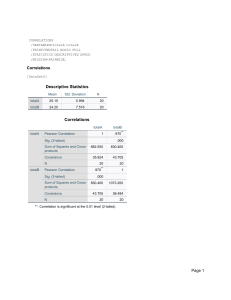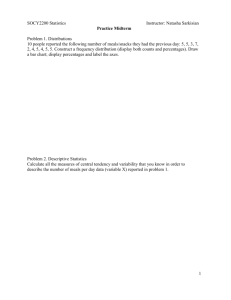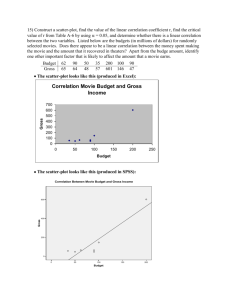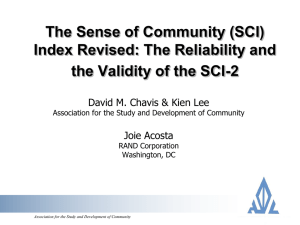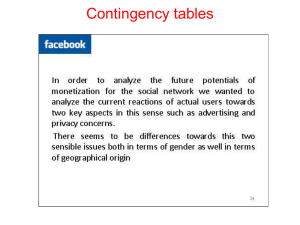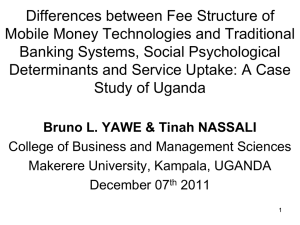SPSS Output to Word: Tutorial
advertisement
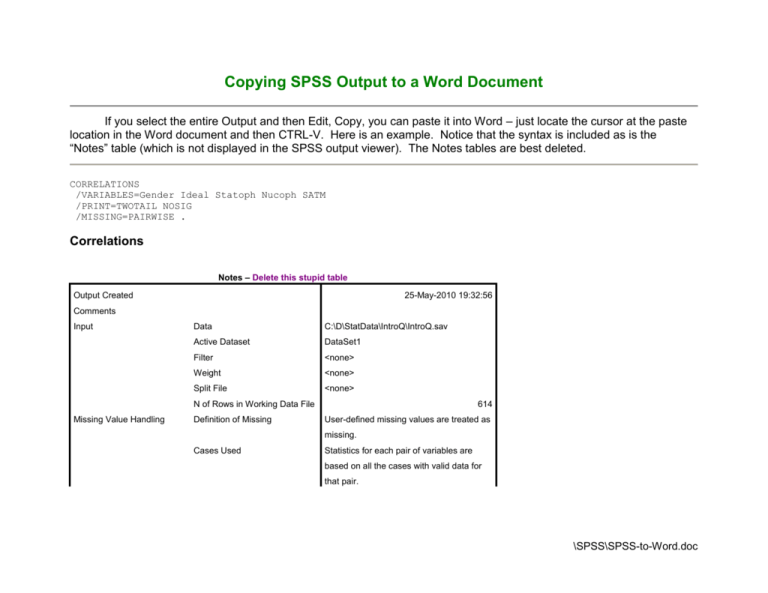
Copying SPSS Output to a Word Document If you select the entire Output and then Edit, Copy, you can paste it into Word – just locate the cursor at the paste location in the Word document and then CTRL-V. Here is an example. Notice that the syntax is included as is the “Notes” table (which is not displayed in the SPSS output viewer). The Notes tables are best deleted. CORRELATIONS /VARIABLES=Gender Ideal Statoph Nucoph SATM /PRINT=TWOTAIL NOSIG /MISSING=PAIRWISE . Correlations Notes – Delete this stupid table Output Created 25-May-2010 19:32:56 Comments Input Data C:\D\StatData\IntroQ\IntroQ.sav Active Dataset DataSet1 Filter <none> Weight <none> Split File <none> N of Rows in Working Data File Missing Value Handling Definition of Missing 614 User-defined missing values are treated as missing. Cases Used Statistics for each pair of variables are based on all the cases with valid data for that pair. \SPSS\SPSS-to-Word.doc Syntax CORRELATIONS /VARIABLES=Gender Ideal Statoph Nucoph SATM /PRINT=TWOTAIL NOSIG /MISSING=PAIRWISE . Resources Processor Time 00:00:00.000 Elapsed Time 00:00:00.016 [DataSet1] C:\D\StatData\IntroQ\IntroQ.sav Correlations Gender Gender Pearson Correlation Ideal 1 Sig. (2-tailed) N Ideal Statoph Nucoph SATM Pearson Correlation 614 -.570** Statoph Nucoph SATM -.570** -.145** -.075 .067 .000 .000 .064 .138 609 613 613 492 1 .093* .084* -.039 .022 .038 .384 Sig. (2-tailed) .000 N 609 609 608 608 490 -.145** .093* 1 -.001 -.337** Sig. (2-tailed) .000 .022 .982 .000 N 613 608 613 613 491 -.075 .084* -.001 1 .043 Sig. (2-tailed) .064 .038 .982 N 613 608 613 613 491 -.039 -.337** .043 1 Pearson Correlation Pearson Correlation Pearson Correlation .067 .343 Sig. (2-tailed) .138 .384 .000 .343 N 492 490 491 491 **. Correlation is significant at the 0.01 level (2-tailed). *. Correlation is significant at the 0.05 level (2-tailed). GRAPH /LINE(SIMPLE)=MEAN(Nucoph) BY Year . Graph Notes – Delete this stupid table Output Created 25-May-2010 19:32:56 Comments Input Data C:\D\StatData\IntroQ\IntroQ.sav Active Dataset DataSet1 Filter <none> Weight <none> Split File <none> N of Rows in Working Data File Syntax 614 GRAPH /LINE(SIMPLE)=MEAN(Nucoph) BY Year . Resources Processor Time 00:00:00.329 492 Notes – Delete this stupid table Output Created 25-May-2010 19:32:56 Comments Input Data C:\D\StatData\IntroQ\IntroQ.sav Active Dataset DataSet1 Filter <none> Weight <none> Split File <none> N of Rows in Working Data File Syntax 614 GRAPH /LINE(SIMPLE)=MEAN(Nucoph) BY Year . Resources Processor Time 00:00:00.329 Elapsed Time 00:00:00.344 [DataSet1] C:\D\StatData\IntroQ\IntroQ.sav If this does not work (for example, if not all of the tables and charts are copied into the Word document), try the Export function. In the output window, click “File” and select “Export.” Under “Objects to Export,” select “All visible.” Under “Document Type,” select “Word/RTF (*.doc). Browse to the folder where you wish to deposit the exported document and then give it a name. Sometimes SPSS output is too wide properly to fit on paper in portrait layout. To change the layout to landscape, click “Change Options.” Click “Page Setup for Export.” Here I have changed the “Orientation” to “Landscape.” You might also want to reduce the left and right margins to accommodate very wide output. You can also export the output to one of several other different types of documents, including htm and pdf. If you export to htm each graphic will be put in a jpg file that is pulled by the htm file. Karl L. Wuensch, Department of Psychology, East Carolina University. January, 2012. Return to my SPSS Lessons page.
